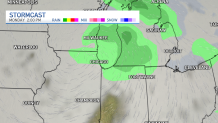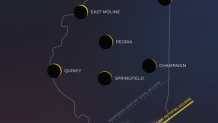With the rainy and stormy start to April in the Chicago area, many might be wondering, what would a rainy or cloudy forecast mean for the upcoming 2024 solar eclipse?
Will it still be visible?
The answer is yes, but likely not how many would expect.
Here's what to know:
What happens if it rains?
If it rains during the Monday's total solar eclipse, the rare celestial event may be slightly visibile but will "not be very impressive," according to NBC 5 Storm Team Meteorologist Alicia Roman.
"The sky may 'dim' and get a little darker, but that will be about it," Roman said.
What if it's cloudy during the solar eclipse?
If rain holds off and only clouds remain, the visibility for the eclipse could depend on the type of clouds that appear.
"If you have high thin clouds, it can block the view slightly but will still allow for much of the eclipse to be visible," Roman said. "If you have low, thick clouds, like what it looks like we may have, it will still look darker for the duration of the eclipse, it just wont be as dramatic as if it were a sunny day and turning completely dark the next second. The skies will just dim or get a little darker."
Feeling out of the loop? We'll catch you up on the Chicago news you need to know. Sign up for the weekly> Chicago Catch-Up newsletter.
When a solar eclipse happens, some clouds tend to disappear.
Scientists at the Royal Netherland Meteorological Institute recently found shallow cumulus clouds dissipate in large number when just 15% of the sun is covered. That’s because the earth’s surface cools when the sunlight is blocked, reducing updrafts of warm air that usuaully emanate. Those updrafts are necessary to form cumulus clouds since they carry water vapor as they rise into cooler altitutdes.
What is the current forecast for the Chicago area and Illinois?
According to Roman, early forecast predictions Tuesday showed the forecast for the April 8 eclipse could see rain and thick clouds.
It is worth noting, however, that predictions this far out aren't as reliable and conditions could still change in the lead up to the event.

According to the National Weather Service's most recent predictions, storms are possible across much of the path of totality. Some of those storms could even become severe.
Southern Illinois appears to be in the path of potential rain and thunderstorms, as of Tuesday. Across Illinois, cloud cover forecasts indicated 30-40% coverage in the predictions.
The NWS also notes, however, that skygazers should "expect the forecast to change" and check back continuously.
What time is the solar eclipse?
According to NASA scientists, the eclipse will take place on Monday, April 8 in the afternoon hours across the North American continent, with the area of totality impacting areas in southern Illinois and central Indiana.
During a total solar eclipse, the new moon intersects the path of the sun in the sky, causing the sun to be partially and then nearly completely blocked from view.
In Carbondale, Illinois, the partial eclipse on April 8 will begin at approximately 12:42 p.m. During this time, special glasses will be needed to view the eclipse, though there are other ways of seeing the moon’s impact on the sun’s light reaching the Earth.
At approximately 1:59 p.m., “totality” will begin in Carbondale, and during this time, stargazers will be able to look at the eclipse without any aid whatsoever, with darkened skies and the famed “corona” blazing around the edges of the moon.
This period will not last for very long, as totality is expected to end at approximately 2:03 p.m., according to NASA scientists.
The partial eclipse will continue for another hour, ending at approximately 3:18 p.m.
Where is the "path of totality?"
The eclipse's "path of totality" will start in Southwest Texas and move northeast.
The path of totality includes the southern tip of Illinois, central and southern Indiana and Indianapolis. From there, it will race across Cleveland, Ohio; Buffalo, New York and into Maine.
The below map from the Adler Planetarium shows what the eclipse will look like in Illinois, with Carbondale, Mount Vernon, Metropolis and Mount Carmel among the southern Illinois cities in the path of totality.

Will schools be closed for the solar eclipse?
Dozens of schools across Illinois have announced plans to close for the upcoming total solar eclipse on April 8.
According to the Illinois State Board of Education, more than 70 school districts in the state have listed a "not in attendance" day on April 8.
The closures come as many cities, particularly those in the path of totality, prepare to navigate unprecedented traffic and crowds. Many are also closing to offer families a chance to witness what could be a once-in-a-lifetime experience together.
The state's board of education said while many will not have kids in school, it does not encourage schools to use e-learning days for the event.
"While e-learning is a valid option for educational continuity, districts have been advised against preemptively declaring such days in anticipation of the solar eclipse," the board told NBC Chicago in a statement. "The purpose of e-learning days is to replace emergency closure days. The foreseeable increase in traffic or other anticipated challenges preceding the solar eclipse does not meet the criteria of an emergency that warrants an e-learning day."

